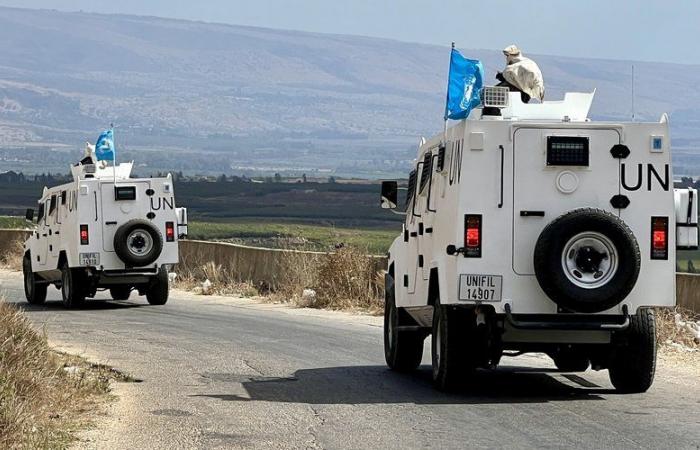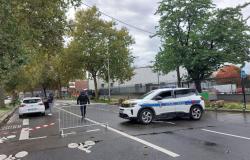
Israel has asked the United Nations Interim Force in Lebanon (UNIFIL) to vacate its positions. Despite the five injured people affected in recent days, the UN organization wants to remain in the territory. Explanations.
The Blue Helmets refused to leave the border area in southern Lebanon as demanded by the Israeli army, determined to stay there despite the attacks which left five injured, in order to plead for de-escalation, assured AFP on Saturday their spokesperson.
“Israeli forces asked us to leave our positions along the Blue Line, from the border up to five kilometers from the Blue Line”explains Andrea Tenenti, spokesperson for the United Nations Interim Force in Lebanon (UNIFIL), in an interview with AFP. The force, which numbers 10,000 men, is now under the crossfire of Israel and Hezbollah, who entered into open war three weeks ago.
“The UN flag must fly”
If the Israeli army asked UNIFIL to empty “environ 29 positions“near the border, she did not mention her headquarters, located in Ras al-Naqoura on the border, which came under fire, particularly from Israel, on several occasions, according to the force.”But there was a unanimous decision for us to stay, because the UN flag must fly in this area and we must be able to report to the UN Security Council.”he continues.
On Thursday, UNIFIL accused Israeli troops of shooting “repeatedly” et “deliberate” on its positions, which triggered a diplomatic outcry. Five peacekeepers have since been injured in attacks, according to the UN force.
Rome and Paris summoned Israeli ambassadors to their soil and Italy went so far as to talk about possibilities “war crimes“. Israel, for its part, explained that it had fired in the direction of “menace” near a UNIFIL position in southern Lebanon where its army is carrying out a vast air offensive and ground incursions against Hezbollah, an ally of Palestinian Hamas.
“Very very difficult”
Mr. Tenenti says UNIFIL’s decision to remain in its positions was taken despite conditions “very very difficult” et “a lot of damage, all the way inside the bases“. “Last night (Friday), “Containers inside the Ghanaian peacekeepers’ position were destroyed by an explosion just outside.”he reports. “The peacekeepers must stay in bunkers […] and it’s very difficult to live like this for 12 months, because it didn’t start yesterday.” affirm M. Tenenti
Hezbollah opened a front in northern Israel in October 2023 in “support” to Hamas, which started the war in Gaza with its deadly attack on October 7, 2023. Today, it is “very difficult to continue surveillance activities because the bombings are incessant”assures Mr. Tenenti, while the primary mission of UNIFIL has been, since 1978 and its strengthening in 2006 after a previous war between Israel and Hezbollah, to ensure the cessation of hostilities. “We have been attacked several times and we have spoken about it publicly”he said. “We speak regularly with both sides to initiate a de-escalation and warn them because attacking peacekeepers is not only a violation of resolution 1701 but also of international humanitarian law,” he adds.
“Avoid disaster”
For him, “there is no military solution”. He therefore pleads for “discussions at political and diplomatic levels” pour “avoid catastrophe”. “The conflict between Hezbollah and Israel is not just a conflict between two countries. Very soon, it could be a regional conflict with catastrophic impact for all,” he continues.
UNIFIL must also work on the unique deployment of the Lebanese army alongside it in southern Lebanon, where Hezbollah is still present, and coordinate humanitarian work in the area. “We work with the parties to […] bring aid to the villages” Or “thousands of people are still stranded in southern Lebanon”he said.
More than 1,200 people killed in three weeks
“We were able to transport some” convoys “but in a very very limited way” in the region where cross-border shootings which have lasted for a year have now given way to open war with ground fighting, salvos of Hezbollah rockets and Israeli air raids.
Across Lebanon, since September 23, more than 1,200 people have been killed and more than a million forced to flee their homes, according to Lebanese authorities.





